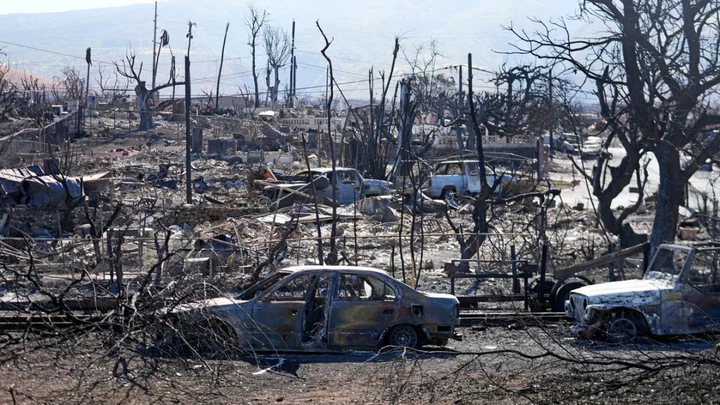Saturday’s surprise attack on Israel by the Palestinian group Hamas may represent one of the biggest failures by Israeli intelligence since the Yom Kippur war of 1973.
The attack involved dozens of infiltrations by land and sea, together with rocket attacks — a sophisticated assault that involves the kind of planning and coordination that intelligence agencies are supposed to pick up on. Hundreds have been killed on both sides.
While Israeli officials have said for months that Palestinian militant groups were preparing for violence, the timing and scale of the attack appear to have caught Prime Minister Benjamin Netanyahu by surprise. Israel and its ally the US — which contributed $3.3 billion to Israel in defense spending in 2022 — were already weighing who was most responsible and how it happened.
“It’s shocking to me that they were able to do it without Israel or the United States picking up on it,” said Martin Indyk, a former US ambassador to Israel and a fellow at the Council on Foreign Relations. “Failure to prepare. Failure to have troops along the border, failure of the fence along the border that they paid millions of shekels for.”
The attack is all the more shocking given that it comes 50 years after Israel’s failure to head off a surprise attack that Egypt and Syria launched on the Jewish holiday, Yom Kippur. That intelligence failure prompted the creation of a commission to figure out what went wrong and became the subject of countless books and scholarly articles.
Israeli officials said it was far too soon to know what went wrong, and rejected any comparison to 1973.
“Please don’t give Hamas the sophistication of the Yom Kippur War,” Israeli Defense Forces spokesman Richard Hecht said. “I know there are a lot of questions about the intelligence. Please stop asking. Right now we’re fighting. I’m sure there will be a lot of discussions about the intelligence down the road.”
Intelligence professionals typically distinguish between failures of collection, failures of analysis, and failures by policymakers to heed warnings from intelligence agencies.
For starters, there was the simple fact that Israel was in the middle of a holiday. And already, questions are being raised about whether Israel’s army and intelligence services were distracted by domestic infighting.
Israelis have protested for months against Netanyahu’s efforts to strip power from the nation’s judiciary. The country is also in negotiations with the US and Saudi Arabia on a complex three-way deal in which Washington would offer security guarantees to Riyadh.
“The real problem here is likely that the Israelis simply did not believe that Hamas would risk a cross-border infiltration,” said Aaron David Miller, senior fellow at the Carnegie endowment for international peace and a former state department Middle East negotiator. “The lack of sufficient Israeli forces in that area was a grievous failure.”
The US Congress will need to ask tough questions, given that Israeli and US intelligence agencies should have been expected to detect an attack on this scale, according to a congressional staffer who asked not to be identified discussing private conversations.
The failure is all the more striking given that Israel’s security services devote substantial resources to monitoring Palestinian society, including Hamas, through networks of human sources, as well as surveillance technology.
Surprise Attacks
Surprise attacks have often galvanized massive responses by the targeted countries. Pearl Harbor and September 11 both heralded the start of new wars and major shakeups in the US’s security services.
Within hours of Saturday’s attack, the Israeli Defense Forces had launched Operation Swords of Iron, carrying out air strikes against targets in the Gaza Strip. Prime Minister Netanyahu declared that Israel is “at war.”
CIA director William Burns canceled a keynote speech he was due to give on Saturday evening at The Cipher Brief Threat Conference in Sea Island, Georgia, in order to work on the crisis, according to conference organizer Suzanne Kelly.
At the conference, retired Navy Admiral James Stavridis, who was Supreme Allied Commander at NATO and regularly liaised with Israeli officials, described the incursion as a “shocking intelligence failure.” He said that while he was not surprised by Hamas’ decision to attack, he was “very surprised” by the tactics the group has adopted, including the speed, fatalities and taking of hostages, which he said would be “high-end bargaining chips.”
Emily Harding, a former CIA Middle East analyst, said the attack, which must have been planned for months, was especially surprising given how capable Israel’s intelligence services have become.
“It’s highly surprising the Israelis missed that planning,” said Harding, a senior fellow Center for Strategic and International Studies. “Time will tell what really happened — there will be months-long investigations to piece together what the IDF and Mossad knew and when they knew it.”
--With assistance from Katrina Manson.
(Updates with new details on Burns, Stavridis starting from 16th paragraph)









